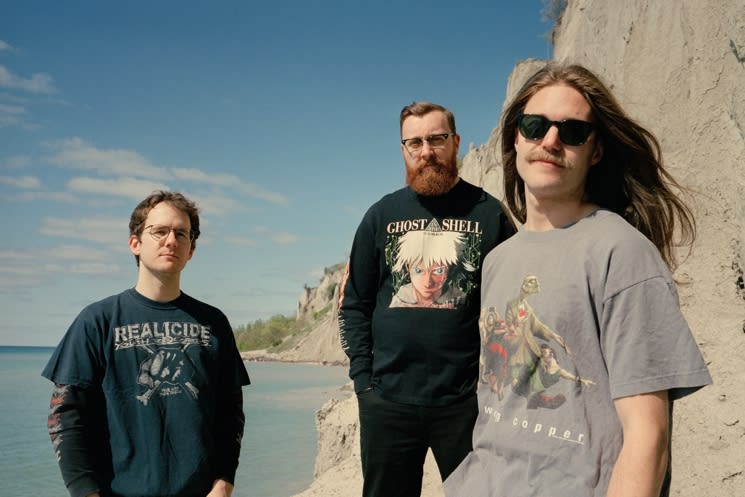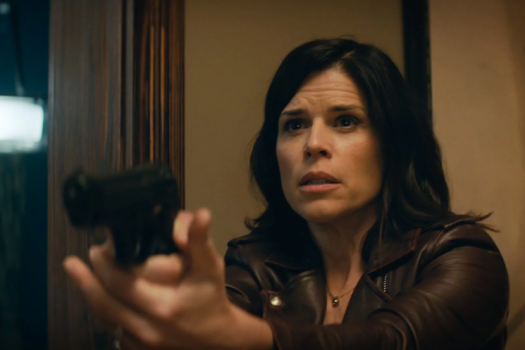After releasing three crushing, influential, and critically acclaimed full-lengths in as many years — 2017's Primordial Malignity, 2018's insta-classic Manor of Infinite Forms and 2019's Planetary Clairvoyance — the members of Tomb Mold needed a change.
"Considering what had led up to our finally jamming this record, we were all in various states of despondency, with the state of the world and our jobs," says drummer-vocalist Max Klebanoff about these sessions, which took place amidst the devastating effects of the pandemic. "I didn't want to be involved with a 'gory death metal band' — not that we were ever really that band. It just had to be something different."
The necessity for something different has manifested as The Enduring Spirit — a dizzying, haunting and beautiful record that sees the Toronto band reach a dextrous new apex.
Eschewing a standard release cycle, The Enduring Spirit was surprise-announced on a Monday and released that Friday (September 15) via 20 Buck Spin. They played a sold-out release show that same night; since then, the praise has been universal.
"For us, it was a big release," says guitarist Payson Power. "And it was cool to see people really react well to it. Like, 'Oh, shit, you have a whole album coming out on Friday!' No songs previously demoed. None of them played live. Nothing to go on. You haven't heard from us."
Klebanoff adds, "I was really encouraged by our steps in making this record. So, it needed to be a really triumphant, really big endeavour, something that's not necessarily 'positive,' but something that people found hope in. It's very triumphant, like a grand rebirth of self. It had to be good, about the acceptance of oneself. It's just extreme and it's bright and it's in-your-face, so the lyrics and the art and everything reflects that. Transformation is a big part of it, like the beginning of a new cycle."
This new cycle coincides with the departure of bassist Steve Musgrave. "Our sound having changed and our priorities having changed, we didn't see the band the same way, so [Musgrave's departure] was pretty natural," Klebanoff reflects. "The band was a whole different being at that point."
The newly minted three-piece — Klebanoff, Power and guitarist/bassist Derrick Vella — entered into an intense state of writing and rehearsing: Vella and Power both took guitar lessons, and Klebanoff practiced incessantly, taking inspiration from drummer Maxwell Patterson of BC no-fi experimentalists i.o. He became obsessed with his instrument, even when it was difficult or painful.
"I went out and bought a resistance pad," Klebanoff says, "which basically guaranteed my practicing would be the most unfun thing imaginable. It was miserable, [and I had to] deconstruct my playing in a way where I knew I was trying stuff that I wouldn't necessarily have been comfortable trying a few years ago. I really tried to do drum parts or arrange drum parts where I just didn't think about vocals. I thought, 'I want to write something that's too hard for me to do vocals over, and then I'll just figure it out later.' That's what this band is all about. It's just figuring it out. It's always been that way."
As Power adds, "I think The Enduring Spirit has the most in common with Primordial [Malignity, the band's first full-length, recorded as a two-piece by Klebanoff and Vella]. It's got the super labyrinthine riffs, really twisty-turny. Those songs on Primordial are very hard to play. Manor and Planets are much more bludgeoning records, so I think the more technical aspect was telegraphed years ago with the genesis of the band; little aspects of it, at least. I think a lot of the things [we wrote] are sort of unconscious, and me and Derrick really pushed ourselves with the guitars. Ultimately, it's still got our fingerprints on it."
Those earlier records positioned the band as one of the leaders of an emerging movement known as the new wave of old school death metal, which harkened back to the genre's necrotic, dripping and pummelling heyday. On the surface, the band's sound owed a huge debt to its Scandinavian — particularly Finnish — forebears, but the Floridian contingent (including Cynic and Death) was not far behind. Couple that with a strong fixation on jazz, dream pop, ambient and video game soundtracks, and Tomb Mold's sonic palette instantly became much more exciting than some of their more brutal contemporaries.
For the band, honouring these past accomplishments has never been as important as evolving, transforming and overcoming.
"I think we endeavour to make every record its own thing," says Klebanoff. "And I think, because this one was such a big step, we really needed it to represent the band as a creative body rather than just a record that we're kind of farting out into the world."
He continues, "We don't have to play the same way for the rest of our lives, and I think that's a conscious decision. We acknowledge that all those records are very important to us, even though they feel like they were made by different people: it was us, but it's still not really us. I'm a different person than who I was two months ago, so think about a record that Derrick and I made in my basement, and I'm looking at a different human being entirely. To deny and affirm both the history and sound of the band, only then can we evolve into something different."
For Power, the notion of change and evolution — as individual instrumentalists, and as a tight and commanding unit — is not only important, but also essential. While fellow guitarist Vella got more soulful (Power describes his solos as being "Miami Vice-esque"), Power went into a more abstruse direction. "I like surprising people," he says. "And I like getting a reaction, whether it's good or bad. I like to plunge people into this odd environment. There were a few of those moments on Planetary, too, but on [The Enduring Spirit], some of the really weird ideas are fully fleshed out."
This diversity of sound and approach is unsurprising, coming from a band who have never shied away from celebrating their esoteric influences. During The Enduring Spirit's writing and recording, Power was listening to "jazz, math rock — tons of math rock — and a lot of J-pop and Japanese math rock. Just bands that use melody in a way that I find really interesting, almost like when the melody is a drill that just bores into your skull, but in an unfamiliar sense."
Films and TV also played a big role in influencing the sound and vibe (clearly more so for Power and Vella than Klebanoff), as did all of their favourite bands, who, as Power admits, "are always going to be part of the DNA." Notably, the album's towering closer, "The Enduring Spirit of Calamity," is seen by Klebanoff as a kindred spirit to the melodic, melancholy "Dreaming in Red" by the almighty Dismember (even if the former is "maybe seven minutes longer").
Incredibly, the band recorded The Enduring Spirit in two three-day sessions, with all of the vocals done in one day. They entered the studio practiced and prepared, and, as Power recalls, "None of [The Enduring Spirit] was dreamed up in the studio. There wasn't any last-minute addition of. 'I'm going to do this,' or, 'Guys, I'm going to try this.' It was planned. We had demoed the record, which we'd never done before." The two sessions, with two weeks in between, gave Tomb Mold and their production collaborators — Sean Pearson and Arthur Rizk — a chance to go back and listen to rough mixes for any issues, another first.
This preplanning inspired the band to take plenty of risks, giving them confidence and leading to some of their most complex and creative compositions to date. There's chaos and dread, but there's also quiet calmness and clean guitars, with restraint shining through the bedlam. "Servants of Possibility" is full of start-and-stop rhythms, veritably funky drums (as Payson reminds us, "the metal word for those parts is 'groove'"), and a glacial, shimmering guitar line reminiscent of a "game over" screen from a '90s SNES game. "Will of Whispers" has a brilliant jazz-fusion intro and some of Klebanoff's most haunting screams, while the lyrics (which were entirely handled by Klebanoff on this album), are poetic, lush and full of imagery, particularly on the highlight "Flesh as Armour."
This unwillingness to repeat themselves, to be pigeonholed, to surrender to some antiquated notion of what death metal should be, has unsurprisingly led to some detractors and gatekeepers: recently, the band were called out on Twitter for their supposedly lazy sartorial choices during a Decibel cover shoot. Power, who admits the situation was blown way out of proportion, was nevertheless frustrated by the accusation.
"I thought I'd respond, and my tweet would get 12 likes from my friends. And some would say 'hell yeah!' and that'd be it. I didn't realize it was gonna explode!"
He continues, "I've been in this band for a minute now, and people have talked shit for a long time, and you get tired of it. It sucks. I was so stoked about the Decibel thing, and for the guy to imply, 'Oh, these guys doing the Decibel photoshoot look like they're going to get the groceries.' Bro, I got a haircut! I was ready, man. I saw somebody on Twitter be like, 'Well, this guy obviously busted out the good vintage,' and they posted an eBay listing of my Resident Evil T-shirt. This costs more than a suit! Do your damn research. But God forbid we look like normal dudes."
Klebanoff adds, "Fuck you. I'm wearing my Sunday best."
All jokes aside, the band are conscious that they are visible and vulnerable on the internet, and that the toxicity of internet culture can get the best of anyone. Although a few like-minded trolls agreed with the judgement (one post shared an image wherein Tomb Mold's heads were photoshopped onto the Blue Album), way more people sided with the band.
Unfortunately for the band members themselves, the most frustrating part of the ordeal was when people came to Tomb Mold's defence by insulting the band the original troll had used as a reference point: British extreme metallers Akercocke. Their own supporters once again reinforced the hyperbolic and hypocritical side of metal fandom.
"The whole point of my post was don't judge a band based on how they look," Power says. "It literally doesn't matter! [And with Akercocke], we have so much sonically in common with that band. That band has taken massive risks in music for years, and so many things they do alienate diehard metal fans. For people to just roast them after that, it was like, there's a million bands in metal you should fucking roast that suck, and that band's not one of them. That band is awesome, they do cool shit, and I was truly disheartened to see people saying, 'Yeah, leave Tomb Mold alone. Look at these guys.' And I thought, 'Yo, you're doing the exact same thing!'"
Similarly, Klebanoff sees it as an easy out for fans who hide behind the safety of a screen. "People are very starved for scapegoats for their small insecurities. They see a band like Akercocke, and they think, 'Why are they doing this? All my bands should look like [Tomb Mold].' And it's just silly."
Power adds, "It's the same thing we get. Dudes who are into harsher metal stuff hear us and think, 'Oh, this is bad for metal,' or, 'These guys look stupid,' or it's 'wimpy' or whatever. You don't have to weigh in on everything."
With Tomb Mold, there is an unpretentious sincerity. They don't want to make enemies or call people out, but their frustration— at the sneering judgement and unchecked antagonization commonplace in metal — is justifiable. There is a consciousness to this band, an honesty and inclusivity that is reflected both by the individuals and their music. The two are inherently connected. As Klebanoff describes it, "The band is impenetrably linked to us as people: we are Tomb Mold, Tomb Mold is us. And this is the record that Tomb Mold has always wanted to make. It is as Tomb Mold as Tomb Mold gets."
Similarly, when asked about the possibility of a music video for one of the album's tracks, the band become downright sheepish, all self-deprecation and comedy, claiming they would come across as either the "bashful death metal band," or, more likely, Weezer (which everyone agreed wouldn't be such a bad thing).
And yet, as Power points out, "I don't think we'll ever do one, because it kind of adds to the air of mystery with the band. When people say, 'Oh, you haven't done anything for a long time,' or, 'When are you gonna play shows,' or all this hubbub about, 'What are you gonna do now that you're back,' part of me knows it'd be great to do a bunch of shit, but the other part of me is like, people care because, when we do stuff, it matters, and people show up. … And that's more our speed, for sure. It's more of the DIY ethos that we're all sort of brought up in."
Ultimately, while Tomb Mold may be a death metal band and The Enduring Spirit is unquestionably a death metal record, it's also so much more than that: it isn't hopeless or misanthropic or gory; instead, it's a record that may actually give people some hope, some power.
It comes from a band who want to build a sense of community, to be accepting, to find solace and comfort in both the self and others. As Klebanoff explains it, The Enduring Spirit "represents a transitional state" for Tomb Mold. It's a transformative record for both the listener and the band.
He continues, "If there's any sort of uncertainty that people feel, they can listen to it and read along with the lyrics and hopefully share some similar sentiments that I felt while writing it, and I think that's a big part of it. It's also very transitional in terms of this period of the band between 2020 and 2023. And maybe it's sort of weirdly meta, where I'm commenting on the band with the lyrics, and I don't think that's obvious but hopefully that's what people take from it.
"This is not the end of the band — it's just another stage in our evolution, until our ouroboros keeps eating itself and it turns into a foot and then we just disappear and then that's it. I like that idea of a band recycling itself until it's refined into nothing and then it disappears. And then that's it — that's our body of work. It's neither good nor bad; it's Tomb Mold. You can take from that what you will, but it's Tomb Mold. That's it."
"Considering what had led up to our finally jamming this record, we were all in various states of despondency, with the state of the world and our jobs," says drummer-vocalist Max Klebanoff about these sessions, which took place amidst the devastating effects of the pandemic. "I didn't want to be involved with a 'gory death metal band' — not that we were ever really that band. It just had to be something different."
The necessity for something different has manifested as The Enduring Spirit — a dizzying, haunting and beautiful record that sees the Toronto band reach a dextrous new apex.
Eschewing a standard release cycle, The Enduring Spirit was surprise-announced on a Monday and released that Friday (September 15) via 20 Buck Spin. They played a sold-out release show that same night; since then, the praise has been universal.
"For us, it was a big release," says guitarist Payson Power. "And it was cool to see people really react well to it. Like, 'Oh, shit, you have a whole album coming out on Friday!' No songs previously demoed. None of them played live. Nothing to go on. You haven't heard from us."
Klebanoff adds, "I was really encouraged by our steps in making this record. So, it needed to be a really triumphant, really big endeavour, something that's not necessarily 'positive,' but something that people found hope in. It's very triumphant, like a grand rebirth of self. It had to be good, about the acceptance of oneself. It's just extreme and it's bright and it's in-your-face, so the lyrics and the art and everything reflects that. Transformation is a big part of it, like the beginning of a new cycle."
This new cycle coincides with the departure of bassist Steve Musgrave. "Our sound having changed and our priorities having changed, we didn't see the band the same way, so [Musgrave's departure] was pretty natural," Klebanoff reflects. "The band was a whole different being at that point."
The newly minted three-piece — Klebanoff, Power and guitarist/bassist Derrick Vella — entered into an intense state of writing and rehearsing: Vella and Power both took guitar lessons, and Klebanoff practiced incessantly, taking inspiration from drummer Maxwell Patterson of BC no-fi experimentalists i.o. He became obsessed with his instrument, even when it was difficult or painful.
"I went out and bought a resistance pad," Klebanoff says, "which basically guaranteed my practicing would be the most unfun thing imaginable. It was miserable, [and I had to] deconstruct my playing in a way where I knew I was trying stuff that I wouldn't necessarily have been comfortable trying a few years ago. I really tried to do drum parts or arrange drum parts where I just didn't think about vocals. I thought, 'I want to write something that's too hard for me to do vocals over, and then I'll just figure it out later.' That's what this band is all about. It's just figuring it out. It's always been that way."
As Power adds, "I think The Enduring Spirit has the most in common with Primordial [Malignity, the band's first full-length, recorded as a two-piece by Klebanoff and Vella]. It's got the super labyrinthine riffs, really twisty-turny. Those songs on Primordial are very hard to play. Manor and Planets are much more bludgeoning records, so I think the more technical aspect was telegraphed years ago with the genesis of the band; little aspects of it, at least. I think a lot of the things [we wrote] are sort of unconscious, and me and Derrick really pushed ourselves with the guitars. Ultimately, it's still got our fingerprints on it."
Those earlier records positioned the band as one of the leaders of an emerging movement known as the new wave of old school death metal, which harkened back to the genre's necrotic, dripping and pummelling heyday. On the surface, the band's sound owed a huge debt to its Scandinavian — particularly Finnish — forebears, but the Floridian contingent (including Cynic and Death) was not far behind. Couple that with a strong fixation on jazz, dream pop, ambient and video game soundtracks, and Tomb Mold's sonic palette instantly became much more exciting than some of their more brutal contemporaries.
For the band, honouring these past accomplishments has never been as important as evolving, transforming and overcoming.
"I think we endeavour to make every record its own thing," says Klebanoff. "And I think, because this one was such a big step, we really needed it to represent the band as a creative body rather than just a record that we're kind of farting out into the world."
He continues, "We don't have to play the same way for the rest of our lives, and I think that's a conscious decision. We acknowledge that all those records are very important to us, even though they feel like they were made by different people: it was us, but it's still not really us. I'm a different person than who I was two months ago, so think about a record that Derrick and I made in my basement, and I'm looking at a different human being entirely. To deny and affirm both the history and sound of the band, only then can we evolve into something different."
For Power, the notion of change and evolution — as individual instrumentalists, and as a tight and commanding unit — is not only important, but also essential. While fellow guitarist Vella got more soulful (Power describes his solos as being "Miami Vice-esque"), Power went into a more abstruse direction. "I like surprising people," he says. "And I like getting a reaction, whether it's good or bad. I like to plunge people into this odd environment. There were a few of those moments on Planetary, too, but on [The Enduring Spirit], some of the really weird ideas are fully fleshed out."
This diversity of sound and approach is unsurprising, coming from a band who have never shied away from celebrating their esoteric influences. During The Enduring Spirit's writing and recording, Power was listening to "jazz, math rock — tons of math rock — and a lot of J-pop and Japanese math rock. Just bands that use melody in a way that I find really interesting, almost like when the melody is a drill that just bores into your skull, but in an unfamiliar sense."
Films and TV also played a big role in influencing the sound and vibe (clearly more so for Power and Vella than Klebanoff), as did all of their favourite bands, who, as Power admits, "are always going to be part of the DNA." Notably, the album's towering closer, "The Enduring Spirit of Calamity," is seen by Klebanoff as a kindred spirit to the melodic, melancholy "Dreaming in Red" by the almighty Dismember (even if the former is "maybe seven minutes longer").
Incredibly, the band recorded The Enduring Spirit in two three-day sessions, with all of the vocals done in one day. They entered the studio practiced and prepared, and, as Power recalls, "None of [The Enduring Spirit] was dreamed up in the studio. There wasn't any last-minute addition of. 'I'm going to do this,' or, 'Guys, I'm going to try this.' It was planned. We had demoed the record, which we'd never done before." The two sessions, with two weeks in between, gave Tomb Mold and their production collaborators — Sean Pearson and Arthur Rizk — a chance to go back and listen to rough mixes for any issues, another first.
This preplanning inspired the band to take plenty of risks, giving them confidence and leading to some of their most complex and creative compositions to date. There's chaos and dread, but there's also quiet calmness and clean guitars, with restraint shining through the bedlam. "Servants of Possibility" is full of start-and-stop rhythms, veritably funky drums (as Payson reminds us, "the metal word for those parts is 'groove'"), and a glacial, shimmering guitar line reminiscent of a "game over" screen from a '90s SNES game. "Will of Whispers" has a brilliant jazz-fusion intro and some of Klebanoff's most haunting screams, while the lyrics (which were entirely handled by Klebanoff on this album), are poetic, lush and full of imagery, particularly on the highlight "Flesh as Armour."
This unwillingness to repeat themselves, to be pigeonholed, to surrender to some antiquated notion of what death metal should be, has unsurprisingly led to some detractors and gatekeepers: recently, the band were called out on Twitter for their supposedly lazy sartorial choices during a Decibel cover shoot. Power, who admits the situation was blown way out of proportion, was nevertheless frustrated by the accusation.
"I thought I'd respond, and my tweet would get 12 likes from my friends. And some would say 'hell yeah!' and that'd be it. I didn't realize it was gonna explode!"
He continues, "I've been in this band for a minute now, and people have talked shit for a long time, and you get tired of it. It sucks. I was so stoked about the Decibel thing, and for the guy to imply, 'Oh, these guys doing the Decibel photoshoot look like they're going to get the groceries.' Bro, I got a haircut! I was ready, man. I saw somebody on Twitter be like, 'Well, this guy obviously busted out the good vintage,' and they posted an eBay listing of my Resident Evil T-shirt. This costs more than a suit! Do your damn research. But God forbid we look like normal dudes."
Klebanoff adds, "Fuck you. I'm wearing my Sunday best."
All jokes aside, the band are conscious that they are visible and vulnerable on the internet, and that the toxicity of internet culture can get the best of anyone. Although a few like-minded trolls agreed with the judgement (one post shared an image wherein Tomb Mold's heads were photoshopped onto the Blue Album), way more people sided with the band.
Unfortunately for the band members themselves, the most frustrating part of the ordeal was when people came to Tomb Mold's defence by insulting the band the original troll had used as a reference point: British extreme metallers Akercocke. Their own supporters once again reinforced the hyperbolic and hypocritical side of metal fandom.
"The whole point of my post was don't judge a band based on how they look," Power says. "It literally doesn't matter! [And with Akercocke], we have so much sonically in common with that band. That band has taken massive risks in music for years, and so many things they do alienate diehard metal fans. For people to just roast them after that, it was like, there's a million bands in metal you should fucking roast that suck, and that band's not one of them. That band is awesome, they do cool shit, and I was truly disheartened to see people saying, 'Yeah, leave Tomb Mold alone. Look at these guys.' And I thought, 'Yo, you're doing the exact same thing!'"
Similarly, Klebanoff sees it as an easy out for fans who hide behind the safety of a screen. "People are very starved for scapegoats for their small insecurities. They see a band like Akercocke, and they think, 'Why are they doing this? All my bands should look like [Tomb Mold].' And it's just silly."
Power adds, "It's the same thing we get. Dudes who are into harsher metal stuff hear us and think, 'Oh, this is bad for metal,' or, 'These guys look stupid,' or it's 'wimpy' or whatever. You don't have to weigh in on everything."
With Tomb Mold, there is an unpretentious sincerity. They don't want to make enemies or call people out, but their frustration— at the sneering judgement and unchecked antagonization commonplace in metal — is justifiable. There is a consciousness to this band, an honesty and inclusivity that is reflected both by the individuals and their music. The two are inherently connected. As Klebanoff describes it, "The band is impenetrably linked to us as people: we are Tomb Mold, Tomb Mold is us. And this is the record that Tomb Mold has always wanted to make. It is as Tomb Mold as Tomb Mold gets."
Similarly, when asked about the possibility of a music video for one of the album's tracks, the band become downright sheepish, all self-deprecation and comedy, claiming they would come across as either the "bashful death metal band," or, more likely, Weezer (which everyone agreed wouldn't be such a bad thing).
And yet, as Power points out, "I don't think we'll ever do one, because it kind of adds to the air of mystery with the band. When people say, 'Oh, you haven't done anything for a long time,' or, 'When are you gonna play shows,' or all this hubbub about, 'What are you gonna do now that you're back,' part of me knows it'd be great to do a bunch of shit, but the other part of me is like, people care because, when we do stuff, it matters, and people show up. … And that's more our speed, for sure. It's more of the DIY ethos that we're all sort of brought up in."
Ultimately, while Tomb Mold may be a death metal band and The Enduring Spirit is unquestionably a death metal record, it's also so much more than that: it isn't hopeless or misanthropic or gory; instead, it's a record that may actually give people some hope, some power.
It comes from a band who want to build a sense of community, to be accepting, to find solace and comfort in both the self and others. As Klebanoff explains it, The Enduring Spirit "represents a transitional state" for Tomb Mold. It's a transformative record for both the listener and the band.
He continues, "If there's any sort of uncertainty that people feel, they can listen to it and read along with the lyrics and hopefully share some similar sentiments that I felt while writing it, and I think that's a big part of it. It's also very transitional in terms of this period of the band between 2020 and 2023. And maybe it's sort of weirdly meta, where I'm commenting on the band with the lyrics, and I don't think that's obvious but hopefully that's what people take from it.
"This is not the end of the band — it's just another stage in our evolution, until our ouroboros keeps eating itself and it turns into a foot and then we just disappear and then that's it. I like that idea of a band recycling itself until it's refined into nothing and then it disappears. And then that's it — that's our body of work. It's neither good nor bad; it's Tomb Mold. You can take from that what you will, but it's Tomb Mold. That's it."




